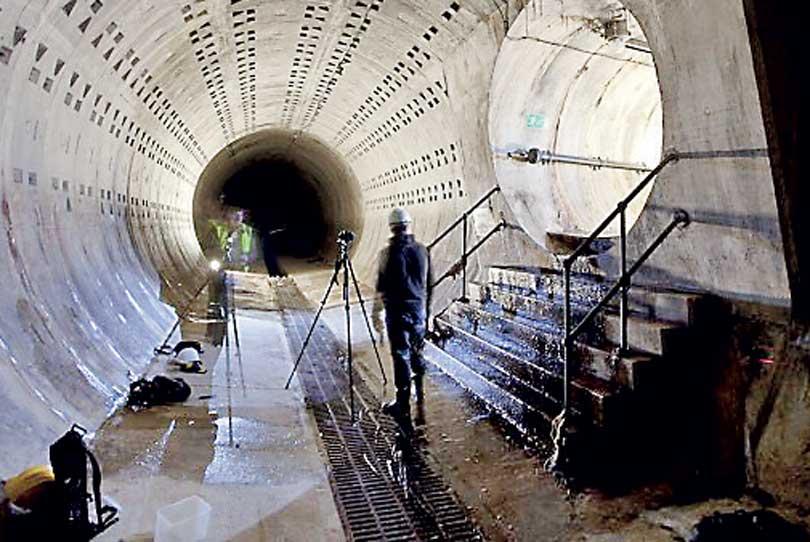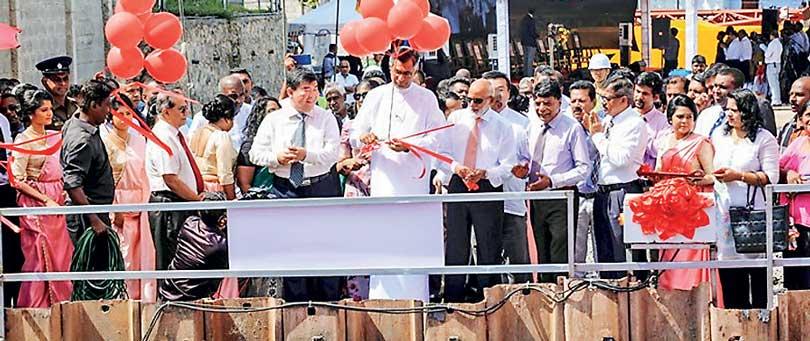10 Sep 2019 - {{hitsCtrl.values.hits}}
Mitigating negative socio-economic impacts of floods

One of the main causes delaying Colombo’s economic potential has been its ill-preparedness to deal with frequent floods : World Bank
By Sheain Fernandopulle
The construction work of the New Mutwal Storm Water Drainage Tunnel in Colombo-North to mitigate negative physical, social and economic impacts of floods kicked off recently.
At the launch of the construction work, Megapolis and Western Development Minister Champika Ranawaka said he was happy to commence the works of a tunnel to carry storm water out of Colombo after the Dutch period 300 years ago.
He said Colombo, which is a lowland, experienced a number of floods in the recent past. “As a solution to this, large reservoirs were made. Howsoever, reservoirs only resolved one third of the solution. Therefore, with the World Bank funding and with the intervention of the Sri Lanka Land Development Corporation, we hope to create canals, tunnel and pumping stations to carry water out of the city to the ocean. The Ambatale pumping station is carrying out its works. We hope to mitigate the flood impact of Kaduwela and Kolonnawa from this,” he said.
He said the ministry was carrying out construction of a pumping station at Nagalagamvidiya to resolve the flood impact in the Colombo-North areas including Thotalanga.
“Similarly, we are constructing two tunnels in the vicinity of the Independence Square from near the Royal College to address the flood issue in the area. We have already constructed a tunnel across the D.S. Senanayake College and near Kynsey Road. The National Water Supply and Drainage Board is carrying out constructions to renovate the 150-year old water supply network. The Asian Development Bank has funded to renovate the sewerage system while we are constructing storm-water drainage tunnels,” he said.
With the World Bank funding and with the intervention of the Sri Lanka Land Development Corporation, we hope to create canals, tunnel and pumping stations to carry water out of the city to the ocean
Meanwhile, speaking at the ground-breaking ceremony, Darshini De Silva, Senior Environment Specialist who represented the World Bank Country Director for Maldives, Nepal and Sri Lanka, said one of the main causes delaying Colombo’s economic potential has been its ill-preparedness to deal with frequent floods.
“The worst in recent times has been the 2010 floods with significant damages to economic and productive assets in the city. The annual flooding events during the last few years continue to add to the costs. This groundbreaking - a much awaited event for the largest single contract under the Metro Colombo Urban Development Project or the MUDP – is also a fresh example of the long and productive partnership between the Government of Sri Lanka and the World Bank,” she said. She said the storm water drainage tunnel, which will prove to be critical for flood mitigation, was made possible through the implementation of the MCUDP.
“The MCUDP commenced in 2013 with an objective of reducing flooding in the catchment of the Colombo water basin. It is financing large and complex flood management investments across the city. A dedicated Project Management Unit has been working to design and implement flood mitigation infrastructure. This infrastructure includes a network of pumping stations, canal bank protection, and small scale and larger scale drainage tunnels – such as Mutwal. The cumulative effect of this infrastructure will help meet the MCUDP objective of reducing flooding in Colombo,” Ms. De Silva said in a statement.
She also said a complex project of this nature required the team to take a multi-pronged approach to mitigate the effect of floods and to lessen the negative socio-economic impacts on people.
“Selected priority canals and drains have been rehabilitated, while a path to integrated flood management has also been followed. Similarly, the project is enhancing flood discharge capacity of the system by constructing new diversion paths through tunneling, open cut channels, and flood controlling structures and maintaining the wetlands. The New Mutwal tunnel is an important new outfall in the system and this groundbreaking ceremony is yet another step forward for the Project,” she said.

According to the World Bank representative, the MCUDP has built and rehabilitated approximately 45 kilometers of roads including improving Galle and Duplication Roads; strengthened on-the-job capacities of local authorities in procurement, contract management, and quality and safety standards of municipal roads; designed and opened Colombo’s first urban wetland park at Bedeganna; rehabilitated Viharamahadevi Park, Crow Island Beach Park and the Linear Park alongside Beira Lake; initiated and facilitated the development of the urban wetland strategy, legal protection of remaining wetlands in the Colombo Metropolitan Area and making Colombo the first South Asian Ramsar accredited wetland city.
Over 20 sub-projects to improve drainage capacity and canals, and reduce risks of localized flooding have been completed; while three large pumping stations at Ambatale, North Lock, and St Sebastian South are now under construction.
“I would like to take this opportunity to congratulate the MCUDP team and the Government of Sri Lanka for these achievements and thank them for their continued dedication to make Colombo more resilient. As the world faces the consequences of climate change and global warming, as weather patterns turn unpredictable and we face more and more natural disasters, the only way forward is to build the resilience of a country and its people. That is what we aim to do, for which we will continue to proudly partner with the Government of Sri Lanka,” Ms. De Silva said.
25 Dec 2024 37 minute ago
25 Dec 2024 54 minute ago
25 Dec 2024 1 hours ago
25 Dec 2024 2 hours ago
25 Dec 2024 2 hours ago